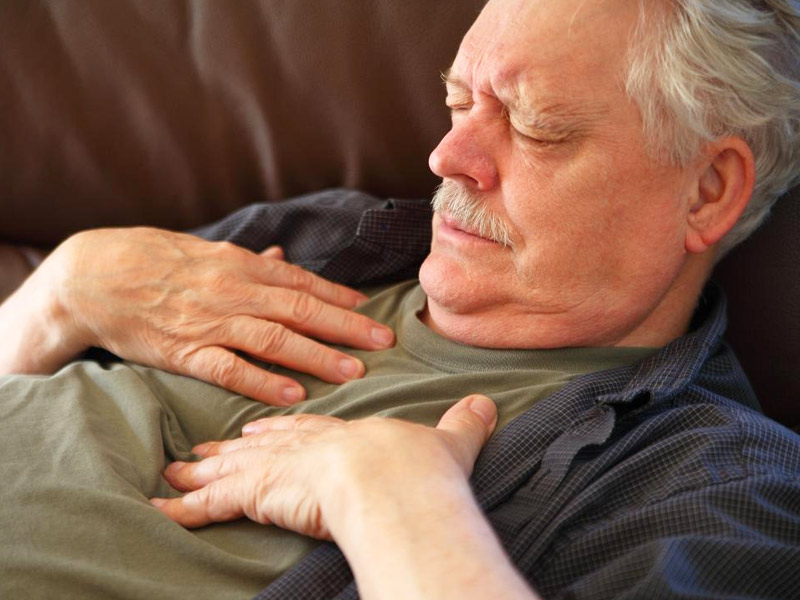
Many people find it hard to breathe as they lie down on the bed to rest. When they get up, their breathing is normal but it only gets interrupted in the horizontal position. This could be temporary or some people might be experiencing this regularly which is a sign of orthopnea condition. Generally, this condition is developed over time but it can also happen suddenly in some cases. The primary reason behind orthopnea is the lack of oxygen supply to the lungs due to either reason. If you think orthopnea is similar to sleep apnea, you are mistaken. Follow this article as Dr Devendra Kumar Singh, Associate Professor and Senior Consultant Pulmonary Medicine, Sharda hospital, Greater Noida tells more about shortness of breath while lying down.
Table of Content:-
Symptoms of Orthopnea
While the most prominent sign that you have orthopnea is shortness of breath as you lie down, there are many other symptoms that one may experience along. Your breathing would become normal as you sit or stand and this is why many people fail to recognise the symptoms let alone the problem. The other symptoms indicating severe problem are:
- Difficulty breathing when you exercise or exert your body
- Sudden unexplained weight gain
- Chronic fatigue or extreme tiredness
- Swelling on feet and ankles
- Breathlessness while waking up
To know how severe your orthopnea is, you can take the pillow test. In this, you are supposed to layer pillows so that you can breathe with ease when lying down. The more pillows you need, the severe is your lung condition and breathing capacity. You must see a doctor to get treated.

What Causes Orthopnea?
After symptoms, one needs to know what causes a health disease. Talking about orthopnea, since this condition is related to breathing difficulties, it shows that your lung functions are compromised. In some cases, orthopnea is a symptom of heart disease such as heart failure.
- When your heart is unable to pump out a sufficient amount of blood to the lungs, orthopnea is caused.
- Poor blood flow causes heart failure.
- High blood pressure, cardiomyopathy and some other heart diseases also cause shortness of breath while sleeping.
- Orthopnea is also caused when your lungs get filled with fluids that obstruct breathing.
Also Read: One-Day Lung Detox Plan By Lifestyle Coach Luke Coutinho
When you lie down, the fluid inside the lungs lay on the side causing lesser space for air or oxygen. Thus, when you lie, you experience breathing troubles. On the other hand, when you are in a vertical position such as stand or sit, there is ample space for air inside the lungs and hence, no problem is felt. If you have breathing discomfort due to heart failure, the symptoms worsen as your heart has to work extra to pump blood against increased air pressure. This causes the lungs to absorb more fluid. The other possible causes of fluid in the lungs are:

- Blood clots that might have travelled from another body part to the lungs
- Breathing toxic or polluted air that increases lung toxicity
- Taking illegal drugs or certain medicines that trigger fluid buildup inside the lungs
- Acute respiratory distress syndrome (ARDS)
- High-altitude pulmonary edema (HAPE)
Also Read: Can Wearing Face Mask Cause Carbon Dioxide Toxicity In The Lungs?
How is Orthopnea Diagnosed?
Timely diagnosis is very important in such cases because if you delay treatment, the health condition of the patient may worsen. You need to tell the doctor about all the problems you are facing when lying down. This includes the level of breathing discomfort, number of pillows required to catch a breath and sleep peacefully, worsening of symptoms over time, wheezing or coughing while lying down, etc.
Following are the tests that help in diagnosing the root cause:
- Blood test: To determine the levels of oxygen and carbon dioxide in the blood sample. For suspected condition, doctor would also check for B-type natriuretic peptide (BNP) which indicates fluid inside the lungs causing heart problem.
- X-ray- To find if there is fluid inside the lungs.
- Echocardiogram
After the results of these diagnoses, the doctor could tell the exact cause and treatment for the possible condition.
Conclusion
Treatment of orthopnea depends on the cause of the condition. You can get temporary relief by keeping pillows under the neck and lifting the upper body while sleeping. However, it is best to get proper treatment for permanent relief. The doctor may prescribe you diuretics that help in releasing extra fluid from the body. Besides, for patients with severe orthopnea, oxygen might be provided through tubes inserted in the nose.
Read More Articles in Other Diseases
Also watch this video
How we keep this article up to date:
We work with experts and keep a close eye on the latest in health and wellness. Whenever there is a new research or helpful information, we update our articles with accurate and useful advice.
Current Version